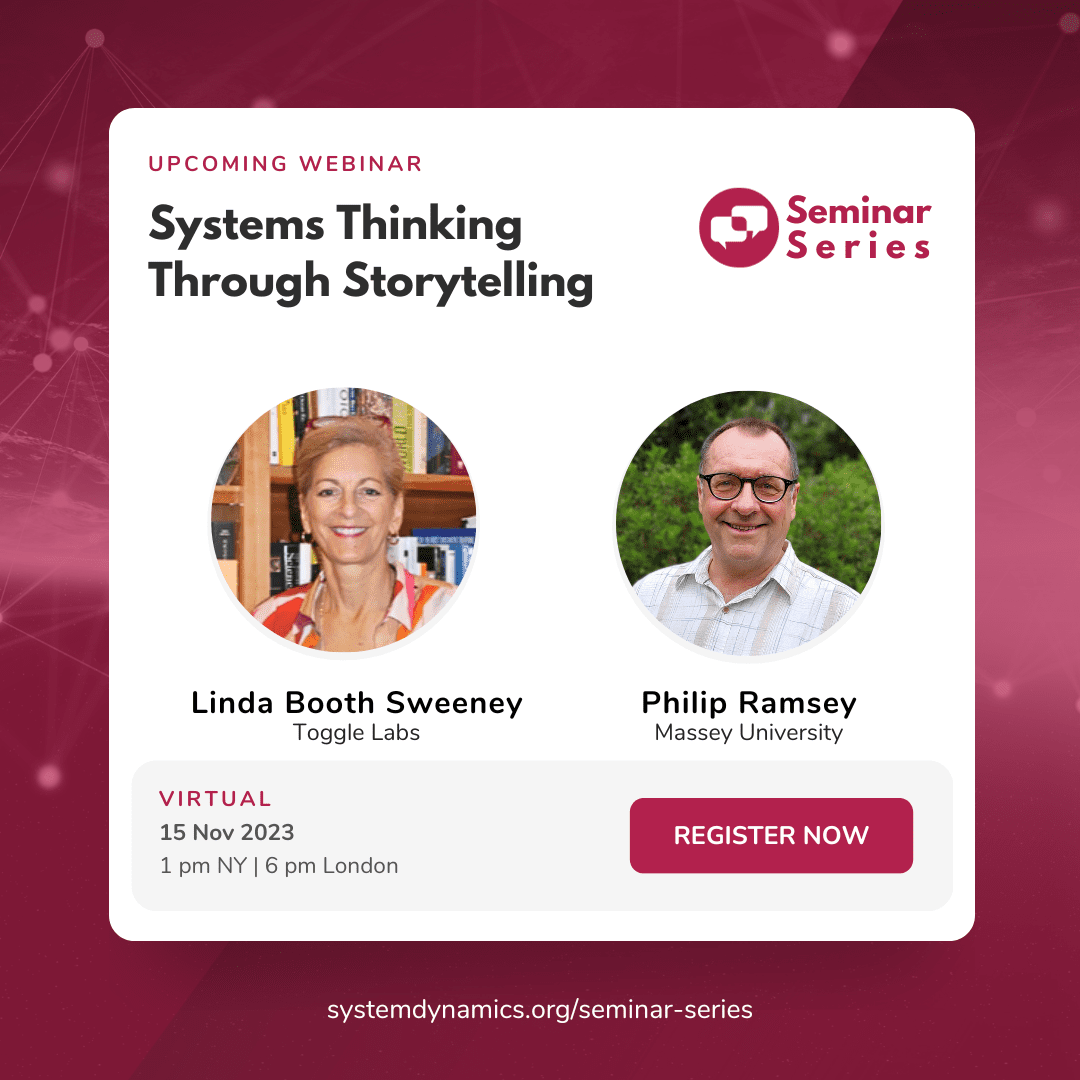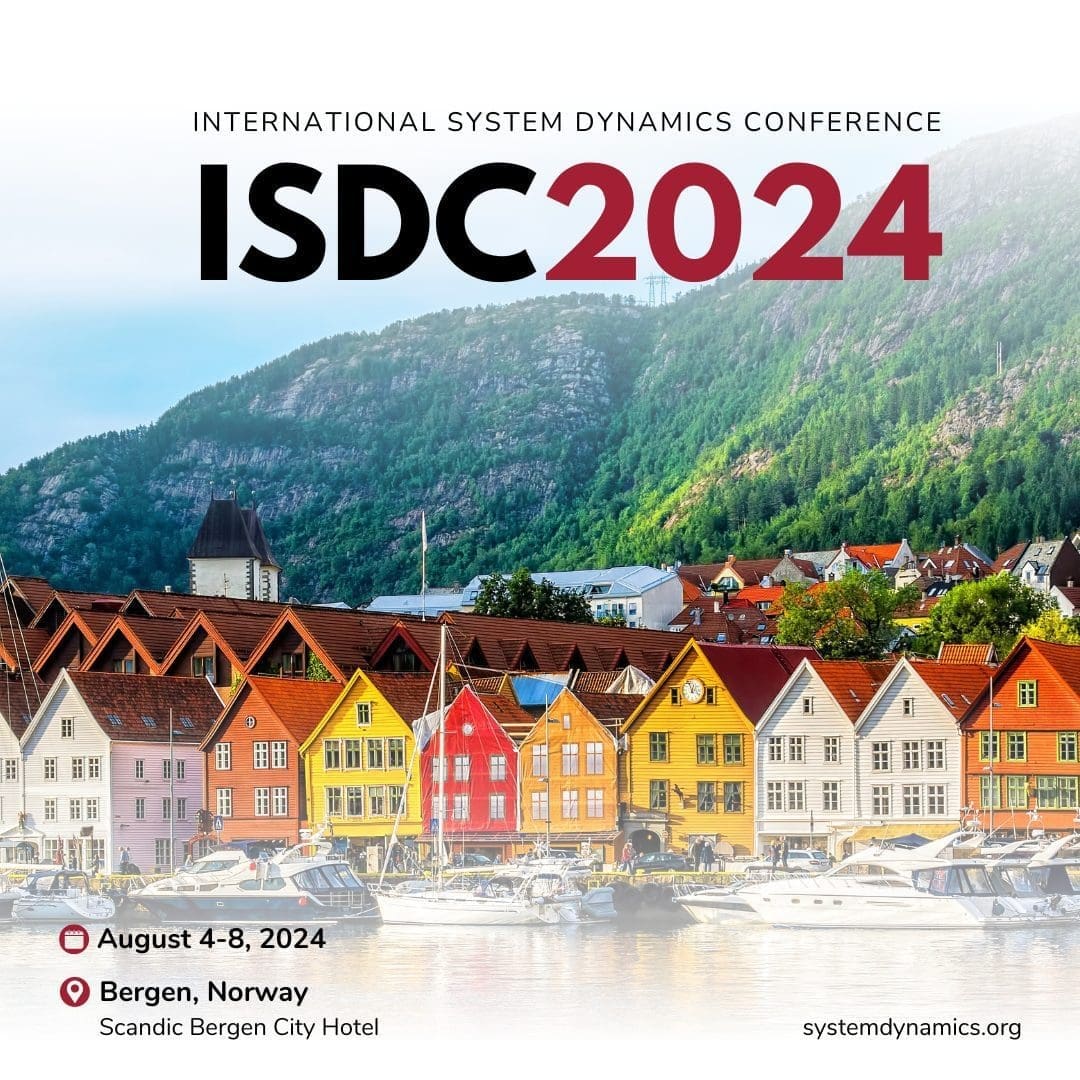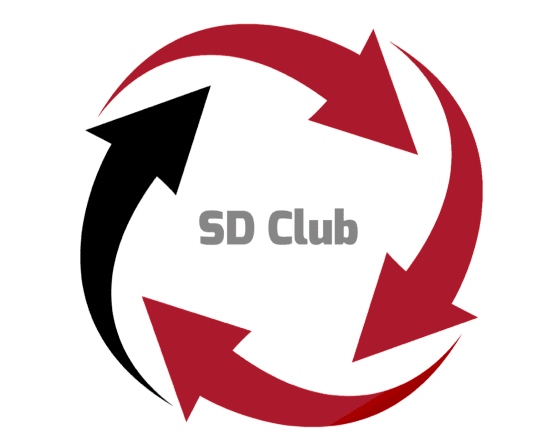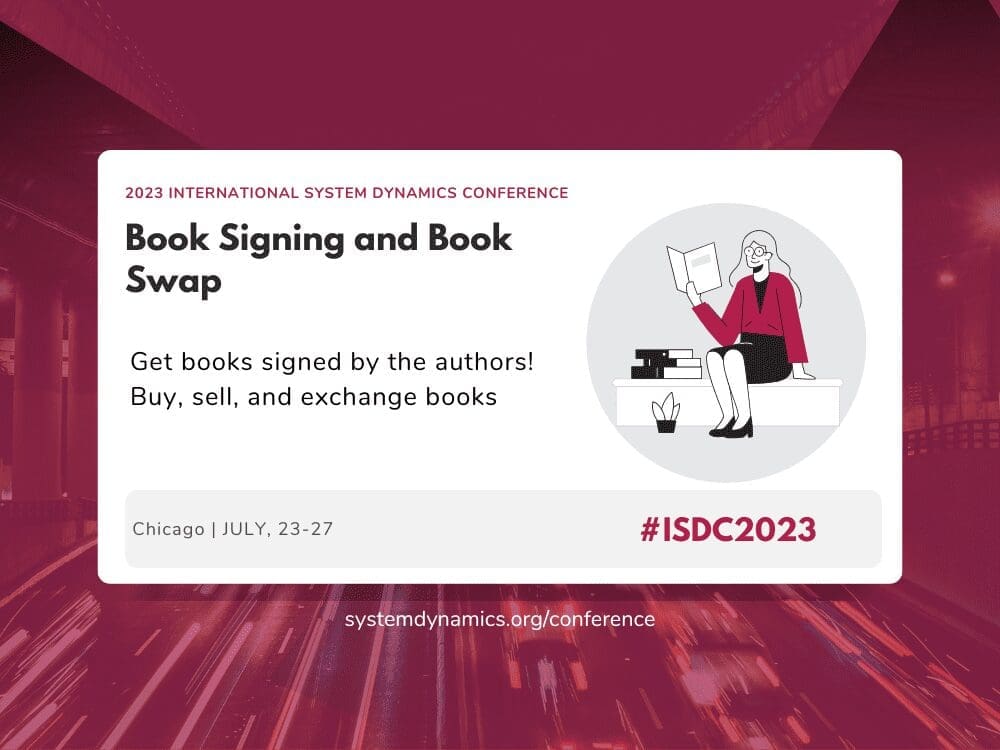Systems Thinking Through Storytelling
1 pm NY | 6 pm London | 2 am (Nov 16) Beijing | Time Converter
Systems Thinking Through Storytelling
Join us for a free seminar with Linda Booth Sweeney and Philip Ramsey, systems educators and authors whose books help teach about systems thinking through storytelling.
Linda will share “Curious about Connections,” a simple, inquiry-based teaching framework that fosters collaborative, inclusive dialogue while promoting systems thinking, critical thinking, communication skills, and empathy. She’ll demonstrate how to use this facilitation method using picture books as well as everyday scenarios. She is excited to share this facilitation method with our System Dynamics community and to explore ways families, teachers, and professionals can use it in a variety of settings.
Phil will share about his newly published Billibonk and Frankl book series, a collection of captivating jungle-based fables that showcase principles of systems thinking through the experiences of various animal characters. The stories are engaging and relatable to both children and adults, as they demonstrate how different species in the jungle learn to collaborate and solve problems together. The Billibonk and Frankl stories aim to help children see systems and interdependencies in the world around them.
About the Speakers
Linda Booth Sweeney is an educator, writer and strategist for healthy socio-ecological systems change, Dr. Linda Booth Sweeney is internationally recognized for her efforts to make systems thinking actionable by a wide range of audiences. In her Systems Leadership Labs, Linda creates experiences for leaders to think differently, and to experiment with language, visualization tools and knowledge architecture that better mirrors the complexity they are navigating. She is co-author of The Systems Thinking Playbook, The Climate Change Playbook, and numerous other books and journal articles. Her next book, Apart Together, is a gentle introduction to systems thinking for children and will be published by Balzer & Bray in October 2023. Linda holds her doctorate from Harvard’s Graduate School of Education and lives outside of Boston where she enjoys swimming in Walden Pond and amateur farming. For more information, see:
(systems), www.lindaboothsweeney.net
(children’s) www.lindaboothsweeney.com
(metaverse) https://togglelab.com
Phil is a Senior lecturer at Massey University in New Zealand, where he teaches Organizational Learning, Leadership, and Teamwork. He also works as a Director of Incite Learning, a consulting company that mainly works with schools, helping school leaders apply Organizational Learning concepts to solve tough problems.
MIT System Dynamics Seminar | Institutional Ensembles and Cultural Institutional Capacity
Please visit the MIT System Dynamics Seminars page for more information.
You are invited to attend the System Dynamics Seminar being held on Friday, October 13th from 1:00-2:30pm EST (please note the time change) in the Jay W. Forrester conference room, E62-450, or via Zoom: https://mit.zoom.us/j/98105285349 (Password: SDFA23). Our guest speaker will be Scott E. Page (University of Michigan) presenting Institutional Ensembles and Cultural Institutional Capacity (see abstract and brief bio below, announcement and paper attached). Lunch will be provided to those attending in person and a reminder email will be sent out closer to the date.
If you would also like to schedule a 30-minute 1:1 meeting with him before or after the seminar, please fill out the following Doodle poll by COB Friday, October 6th and I will confirm times and location with a calendar invite: https://doodle.com/meeting/participate/id/dPYN5qAe. Please notify me if you need to meet over Zoom instead.
Abstract
We construct a series of models within a systems framework to analyze the interdependence between a society’s composition of institutions and its cultural-institutional capacity: the knowledge, behaviors, beliefs, norms, and networks that enables institutions to operate. In our models, a society selects a mixture of institutions of various types to allocate resources and take actions. These include markets, hierarchies, democracies, community-based institutions, or even algorithms. These institutional choices contribute to the production of cultural-institutional capacity, and, conversely, cultural-institutional capacity influences how well each institutional type performs. Cultural-institutional capacity building can be self-reinforcing. Markets can produce greater capacity for markets. It can also be generic and improve all institutional types. Neither of these forms of capacity building necessarily produces efficient ensembles of institutions. Paradoxically, systems with both forms can result in the collapse of an institutional type that builds generic capacity.
About the Presenter
Scott E. Page is the John Seely Brown Distinguished University Professor of Complexity, Social Science, and Management at the University of Michigan, and the Williamson family Professor of Business Administration, professor of management and organizations, Stephen M. Ross School of Business; professor of political science, professor of complex systems, and professor of economics, LSA. In 2011, he was elected to the American Academy of Arts and Sciences. Read more here.
Tackling Structural Racism in Health – Health Affairs
Understanding and addressing the impact of structural racism on health is essential to building health equity.
The October 2023 issue of Health Affairs, “Tackling Structural Racism in Health,” builds on the groundbreaking work contained in our February 2022 theme issue, “Racism & Health.”
It deepens and extends the scholarship on the relationship between structural racism, health, and health care with new research and perspectives on the politics of racism and how it is ingrained in health research and society.
You are invited to join us on Tuesday, October 3, 1:00 p.m. – 5:00 p.m. (Eastern) for a virtual forum at which panels of distinguished authors and experts will present their work and engage in discussions on topics including “Politics and the Legacy of Racism“; “Use Of Race And Ethnicity Data“; “Documenting Racism“; and “Responses to Racism.”
ISDC2023 Plenary Speaker Arielle Deutsch, Research Scientist at Avera Health will discuss findings from the forthcoming Health Affairs (#1 health policy journal) research entitled “How Funding Policy Maintains Structural Inequity within Indigenous Community-based Organizations”
REGISTER
other feature speakers:
Denis Agniel, Statistician, RAND Corporation
• Joseph Betancourt, President, The Commonwealth Fund
• Jessica Bylander, Senior Editor, Health Affairs
• Michael Paul Cary, Elizabeth C. Clipp Term Chair of School of Nursing, Duke University
• Chanelle M. Diaz, Assistant Professor, Department of Medicine, Columbia University Irving Medical Center
• Zachary Dyer, MD Candidate, Chan Medical School, University of Massachusetts
• Shekinah Antoinette Fashaw-Walters, Assistant Professor, Division of Health Policy & Management, University of Minnesota
• Sandro Galea, Dean and Robert A. Knox Professor, Boston University School of Public Health
• Gilbert Gee, Professor and Chair, Department of Community Health Sciences, Fielding School of Public Health, UCLA, and Health Affairs Issue Adviser
• Simon Haeder, Associate Professor, School of Public Health, Texas A&M University
• Tina Hernandez-Boussard, Associate Dean of Research and Professor of Medicine, Stanford University
• Chidinma Adanna Ibe, Assistant Professor, Johns Hopkins Medicine
• Simbo Ige, Managing Director, Programs, Robert Wood Johnson Foundation
• Jaquelyn L. Jahn, Assistant Professor, Dornsife School of Public Health, Drexel University
• Elaine Khoong, Assistant Professor, University of California, San Francisco; UCSF Division of General Internal Medicine, San Francisco General Hospital; and Health Affairs HEFT Fellow
• Jamila Michener, Senior Associate Dean for Public Engagement, Brooks School of Public Policy, Cornell University
• Jennifer Miles, Postdoctoral Associate, Institute of Health, Health Care Policy and Aging Research, Rutgers University
• Ryan Petteway, Associate Professor, OHSU-PSU School of Public Health
• Jason Semprini, Postdoctoral Scholar, University of Iowa
• Milkie Vu, Assistant Professor in Preventive Medicine, Northwestern University
• Vabren Watts, Director of Equity, Health Affairs
• Joel S. Weissman, Deputy Director/Chief Scientific Officer, Center for Surgery and Public Health, Massachusetts General Hospital; and Associate Professor of Medicine, Institute of Health Policy, Massachusetts General Hospital
• Ruqaiijah Yearby, Kara J. Trott Professor in Health Law, Moritz College of Law, Ohio State University, and Health Affairs Issue Adviser
For questions, contact events@
MIT System Dynamics Seminar | A Replication Study of Operations Management Experiments in Management Science
Please visit the MIT System Dynamics Seminars page for more information.
You are invited to attend the System Dynamics Seminar being held on Friday, October 6th from 12:30-2:00pm EST in the Jay W. Forrester conference room, E62-450, or via Zoom: https://mit.zoom.us/j/98105285349 (Password: SDFA23). Our guest speaker will be Jordan Tong (Wisconsin School of Business) presenting A Replication Study of Operations Management Experiments in Management Science (see abstract and brief bio below, announcement and paper attached). Lunch will be provided to those attending in person and a reminder email will be sent out closer to the date.
If you would also like to schedule a 30-minute 1:1 meeting with him before or after the seminar, please fill out the following Doodle poll by COB Friday, September 29th and I will confirm times and location with a calendar invite: https://doodle.com/meeting/participate/id/dR1Wz7Eb. Please notify me if you need to meet over Zoom instead.
Abstract
Over the last two decades, researchers in operations management have increasingly leveraged laboratory experiments to identify key behavioral insights. These experiments inform behavioral theories of operations management, impacting domains including inventory, supply chain management, queuing, forecasting, and sourcing. Yet, until now, the replicability of most behavioral insights from these laboratory experiments has been untested. We remedy this with the first large-scale replication study in operations management. With the input of the wider operations management community, we identify 10 prominent experimental operations management papers published in Management Science, which span a variety of domains, to be the focus of our replication effort. For each paper, we conduct a high-powered replication study of the main results across multiple locations using original materials (when available and suitable). In addition, our study tests replicability in multiple modalities (in-person and online) due to laboratory closures during the COVID-19 pandemic. Our replication study contributes new knowledge about the robustness of several key behavioral theories in operations management and contributes more broadly to efforts in the operations management field to improve research transparency and reliability.
About the Presenter
Jordan Tong is the Wisconsin Naming Partners Professor and Professor in the Department of Operations and Information Management at the Wisconsin School of Business.
Professor Tong’s research primarily employs mathematical modeling and experimental methods to investigate questions in operations management, analytics, and behavioral science. His research focuses on examining how human cognitive limitations interact with broader system dynamics to inform operations design. He has published in journals such as Management Science, Operations Research, Psychological Science, Manufacturing & Service Operations Management, and Production and Operations Management. He is currently an Associate Editor at Management Science and a Senior Editor at Production & Operations Management.
Professor Tong has taught undergraduate and Master’s-level courses in Operations Management, Operations Analytics, Supply Chain Management, Modeling & Optimization for Business Analytics, and the Psychology of Business Analytics. He received his PhD in Operations Management from the Fuqua School of Business at Duke University and his BA in Mathematics from Pomona College.
MIT System Dynamics Seminar | Relative versus Absolute Aspirations
Please visit the MIT System Dynamics Seminars page for more information.
Attend the System Dynamics Seminar being held next Friday, September 29th from 12:30-2:00 pm EST in the Jay W. Forrester conference room, E62-450, or via Zoom: https://mit.zoom.us/j/98105285349 (Password: SDFA23). Our guest speaker will be Jerker Denrell (University of Warwick) presenting Relative versus Absolute Aspirations (see abstract and brief bio below, announcement attached). Lunch will be provided to those attending in person.
If you would also like to schedule a 30-minute 1:1 meeting with him before or after the seminar, please fill out the following Doodle poll by COB tomorrow, September 22nd and I will confirm times and location with a calendar invite: https://doodle.com/meeting/participate/id/eg2g48rd. Please notify me if you need to meet over Zoom instead.
Abstract
Aspirations impact when managers search for new alternatives. Therefore, their level and adjustment to environmental conditions have important performance consequences. Past research has shown that higher aspiration leads to higher performance unless the environment is turbulent. When conditions can change quickly, long periods of search may not pay off. Using a simple and analytically tractable model, we show that when aspirations are defined in relative terms (being better than others), we get the opposite result: higher aspirations lead to higher performance. These contrasting outcomes are the result of externalities generated by relative aspirations: improvements by one agent can leave others unsatisfied. Our findings have interesting implications for goal setting for individuals and populations.
About the Presenter
Jerker Denrell grew up in Sweden, studied management, economics, philosophy and also some mathematics. He wrote a dissertation on game theory at Stockholm School of Economics but was converted by James March to think about learning and decision-making from a more behavioural perspective. He started his career at Stockholm School of Economics, worked at Stanford Business School, University of Oxford, and is now at University of Warwick. Jerker’s research focuses on learning processes and their implications. Instead of examining whether biases exist in how people process information, he has examined how the sample of experiences available to people can lead to systematic biases in choices and judgment. He also has a keen interest in how randomness impacts our lives and fortunes and how stochastic processes can explain what appears as regularities.
2024 International System Dynamics Conference
The International System Dynamics Conference is an annual event where people from all over the world interested in the practice of System Dynamics and systems thinking gather. Now in its 42nd year, the Conference appeals to audiences across industry and academia. These conferences introduce newcomers to the field, keep practitioners aware of current developments, and provide unparalleled networking opportunities. Participants come from businesses, universities, K-12 education, not-for-profits, government, consulting, the healthcare sector, and beyond. The ISDC2024 will be a hybrid event, with virtual access for all attendees and opportunities for authors to present work virtually or in Bergen.
LIVE tickets include:
- Access to the full program in Bergen, including workshops
- Catered lunch and break-time food (from August 5 to 7)
- Entry to the Banquet event
- Access to all session recordings until September 30, 2024
ONLINE tickets include:
- Access to the full program, including plenaries, parallel sessions, virtual workshops, and roundtables.
- Access to all recordings until September 30, 2024.
Location
The 2024 Conference will take place at the Scandic Bergen City Hotel, a comfortable and well-equipped hotel at the heart of the beautiful city.
Theme
The theme of the 2024 International System Dynamics Conference is “Bridging Perspectives for New Insights.” This theme highlights the need for building bridges across different fields and approaches to benefit everyone
What is your refund policy?
Registrations are not refundable. You may change from in-person to online without penalty until May 28, 2024. A partial refund will be given for the difference between the price paid and the price of the online conference. After May 28, 2024, no refund will be given.
Are there scholarships available?
Yes. Scholarships are available for waiving conference registration fees. We do not provide financial support for travel or accommodation. They are given based on a statement of financial need and a review of written work and are not limited to students. Learn More
Can I buy a ticket for one day only?
No. Single-day tickets are not available. The registration includes access to the full program of the conference.
Where is my member discount?
If you’re logged in, you should see the discounted prices for members. If you’re not seeing the member price, contact us using the chat function in the bottom right of the screen. Please be sure to include your name and login email address so we can better assist you. conference@systemdynamics.org
Does the IN-PERSON ticket include food?
Yes. It includes catered lunch and break-time food for the thee conference days (workshop day not included). It also includes access to the Banquet. Breakfast is included only for those staying at the conference venue and is included in the hotel accommodation fees. Dinners are not provided.
Do you offer bulk ticket purchase discounts?
No. Unfortunately, we are not able to offer bulk discounts at the moment.
Can I upgrade my registration?
Yes. You can upgrade your virtual ticket to an in-person ticket until July 22, 2024, by paying the difference. Please contact us.
Do I need to bring a printed ticket to the venue?
No. We will be able to check you in with your full name.
Do you offer discounts for presenters?
No. Unfortunately, we are not able to offer discounts for presenters.
Where should I stay?
We recommend the conference venue, the Scandic Bergen City. Attendees receive a special discount. Use the code to redeem: BUIB030824
Moo-Hyuk Lee on “Understanding Patient Outmigration from the Patients’ and Providers’ Perspective: A System Dynamics Approach”
Please join us online Friday, October 27th 11AM ET (Boston time. Here is a time converter). In this Collective Learning Meeting (CLM), WPI System Dynamics will host Moo-Hyuk Lee (mooohyuk@gmail.com) who will present
Understanding Patient Outmigration from the Patients’ and Providers’ Perspective: A System Dynamics Approach
Short Description: This presentation delves into our ongoing work on patient outmigration in South Korea. Outmigration, a characteristic phenomenon of the South Korean health system, refers to patients bypassing local hospitals and traveling further to Seoul (the capital city of South Korea) to receive treatment. To unravel the dynamic mechanisms driving outmigration, we designed a causal loop diagram which examined this phenomenon from the patients’ and providers’ perspective. At its simplest level, decrease in objective quality of the provincial hospitals induces the increase in outmigration through the decrease of perceived quality, which then results in quality deterioration by discouraging healthcare providers from working in provincial areas, forming a vicious cycle and reducing trust towards the healthcare system. An early stage of this model was presented at the Student-Organized Colloquium (SOC) of the International System Dynamics Conference (ISDC) in July 2023. Question(s) for the Audience: I seek general feedback on each aspect of the causal loop diagram. I would also like to get insights on what to do next in order to continuously develop the model. Biography: I am a master’s student in Health Policy and Management in Seoul National University College of Medicine, Seoul, South Korea. My undergraduate major was in medicine. I am interested in the use of complex systems approach in healthcare, with prior experiences in agent-based modeling. Since I am relatively new to system dynamics, I would like this presentation to be a valuable opportunity for improving and refining my work. www.linkedin.com/in/moohyuklee001 Recording: We will record this presentation. Moo-Hyuk will share it by request. If you are interested in presenting your work, please contact Christine Tang (ctang@wpi.edu).
WPI System Dynamics Welcome (Back) Session
Please join us online Friday, August 25th 11AM ET (Boston time. Here is a time converter).
In this Collective Learning Meeting (CLM), WPI System Dynamics will host a
Welcome (Back) Session
Happy new semester! Please join us if you want to network and discuss:
- your studies or work
- the International System Dynamics Conference
- and more!
If you are interested in presenting your work, please contact Christine Tang (ctang@wpi.edu).
Call-in details: https://bit.ly/CLM-2023-08-25
A Digital Twin Business Model in 40 Hours
Though long past the date when I should have ‘retired’, I just can’t resist interesting projects, like the one a new friend brought me a few weeks ago. It concerns a small but fast-growing B2B business, providing a management-system SAAS platform for a certain type of real estate company.
The business model is essentially simple. The company gets revenue from [a] implementation fees as clients come on board and [b] continuing SAAS fees from live clients already using the system. Operating costs are dominated by staff in the various teams – sales and marketing, platform development, client onboarding, and customer support. Then there are the costs of running the SAAS platform and the usual overheads of finance, HR, and premises.
The initial problem? … Clients have questions or problems with the platform, so raise support-request ‘tickets’. A support team works to resolve those tickets. Although they already struggle to cope with the rate these tickets arrive, the business expects to double in size this year, and keeps adding new features to the system! So, you may say – hire more staff! But it takes months to learn about the platform and how to resolve client issues, so new staff contribute little to solving tickets and need to be coached while they are learning by the very people who are already struggling to cope.
Meanwhile, new clients must be ‘on-boarded’ – getting them on the system and learning how to use it. But the onboarding team, too, can’t cope with the rate of new clients and the ever-growing feature-set, so those new clients ‘go live’ with too little understanding of the system, so they raise still more tickets. Even after onboarding, ‘novice’ clients continue to raise 3x the rate of tickets of more mature clients.
The wider system. The business has captured the most valuable potential clients over the last 4 years – those with the largest property portfolios, the greatest need for the platform, the highest revenue potential, but also the greatest demand for platform functionality. So the platform developers are under constant pressure to build and release new features. And that pressure means features are released with too many bugs, which leads to more support tickets.
Those tickets come in 3 types – easy “How do I do this?” questions; complaints about things that don’t work; and more complex implementation challenges. So the support team is split in 3 groups too. The overload for each team means that backlogs of unsolved tickets build up. When those backlogs get unacceptable, they have to run “ticket-bashing” sessions when anyone who can help gives up extra time to clear the backlogs. And those sessions are happening more and more often. This puts pressure on the staff, risking a rise in turnover and further loss of even the limited support capacity that exists.
The onboarding team already struggles with existing features, and all new features come with unknown bugs, in spite of developers’ efforts to find them. So clients get new features OK, but fall over more bugs as a result … so the support team gets more support tickets to handle … but they don’t understand the new features either.
And, because the best clients have already been won, the business has no choice but to go for the mid-and small-scale clients. But those clients are harder to win – they have to be made aware, have the platform’s functionality explained, and have to be helped over the challenges that they fear will arise if they adopt it. And then those smaller clients deliver less value when they are won! And they don’t have great staff resources themselves, so they generate proportionally more support requests. Except that they don’t need the fancy extra functionality demanded by the top-range clients.
What my friend needs. First, he needed to just get a handle on the growing imbalance between the flow of support tickets and the capacity of the service team to deal with those requests. So that’s what the initial model did. It showed just how badly the problem would escalate over coming weeks if nothing changed, and pointed to solutions.
But he wanted more than just a working model of the support team’s workload because he could see that was just a symptom of a more complex set of issues, encompassing the whole business, all the way from initial marketing right through to the product development and staffing that has to happen. And of course, he and his colleagues need to understand not only where business development and performance may be going, but the financial implications as well.
So he needs a complete “digital twin” business model, playing out how everything in the system changes over time – platform IT development; marketing and partner acquisition, promotion and sales to 3 client segments, client on-boarding and support; all that ticket-handling across 3 teams; the staff development for all these activities; and all the financial results. And because things change constantly, typical quarterly results and monthly management reports are no use – he needs a model showing how the business is working week by week.
To understand what is going on, we need history – and because the issues surfacing today were triggered by events way back in the past, we need a model that starts in 2021 and goes out to 2024 and beyond.
What we did. My friend is the perfect client – he really “gets” how a living business model works, how powerful it could be, and how to guide its development. And he is willing to put in the hard yards to chase down the data needed. (At least this business has the data, which is often not true. In those cases, we have to estimate and triangulate between known items to fill in the gaps).
So I actually had the lighter load in all this. I spent some 40 hours building the model with the client’s guidance. He put in twice that effort to get that data and figure out with colleagues what had really been happening.
BUT we did it! – a complete digital-twin model that they can now use to work out priorities and policies to fix the current challenges and get the business in a state where it can grow, sustainably, into the future. And do so without the pressures and crises that currently risk overwhelming it. And all by relentlessly following the 4 steps of the strategy dynamics method you can discover in our online course on how to build dynamic business models:
Dynamic Business Modeling
An online course that guides you in creating a quantified, simulated “digital twin” of your business, highlighting inter-dependencies and feedback points.
Society members get a 20% discount
Recent Posts
How to Publish in the System Dynamics Review
How to Publish in the System Dynamics Review In this webinar, we had an overview of the System Dynamics Review – the journal of the System Dynamics Society. We learned about its growing positive performance and impact. We reviewed the process of submitting, revising,...
Metacognition in Stock-flow Failure
Metacognition in Stock-flow Failure Considering the nature of problems in dynamic systems, the systems thinking literature introduces various failures and oversimplified strategies while solving perceived problems of a system and possible reasons for failures. It is...
The Pistachio You Eat Is Affecting Growers’ Water in Iran
The Pistachio You Eat Is Affecting Growers’ Water in Iran Iran and the United States are the leading producers of pistachios in the world, with a joint production of 74% of the world’s total. Rafsanjan, a semi-arid region in Iran, has long been famous for its...
Upcoming Events

2024 Conference Early Bird Registration Deadline
Early bird registration deadline for both live and virtual conference registrations.
Recent Business cases
How to Implement Product Branding Strategies in Big Pharma
How to Implement Product Branding Strategies in Big Pharma The Official Website Lexidyne, LLC specializes in helping clients understand and leverage key cause–and–effect relationships using the principles of System Dynamics. Combining strong facilitation skills with...
CDC Explores Solutions to Counter Diabetes Prevalence
CDC Explores Solutions to Counter Diabetes Prevalence Diabetes mellitus is a growing health problem worldwide. In the United States, the number of people with diabetes has grown since 1990 at a rate much greater than that of the general population; it was estimated at...
Fluor Avoids Costly Project Changes Saving $1.3bn
Fluor Avoids Costly Project Changes Saving $1.3bn Fluor saves $1.3 billion in System Dynamics-based project management. #United States #Engineering #Fluor #Corporation CLIENT: FLUOR Fluor is one of the world’s largest engineering and construction firms, with 2008...
Join us
Book Signing & Book Swap at ISDC 2023
Book Signing & Book Swap at ISDC 2023
Learn about their books directly from the authors!
Don’t miss out! Several book authors will join us at the Book Signing event at ISDC 2023. This event will be held live at the conference in Chicago, on Tuesday, July 25 at 12:15 pm CDT.
If you are an author of books related to System Dynamics or systems thinking, join us at the event!
Buy, sell, and exchange books
Do you have System Dynamics books that are accumulating dust on your shelf? Might other academics and practitioners in the field be interested in reading them?
Conference attendees are welcome to bring their new and used books to buy, sell, and exchange during this Book Swap event at ISDC.
Free shipping on Society books and games to pick up at ISDC
During the month of June, we’ll be providing free shipping coupons for LIVE conference attendees.
Pick up your products* at ISDC during the Book Signing & Book Swap event.
*Promotion only applies to the following specific Society publications, games, and replacement parts for games. Coupon code must be applied at checkout.
GAMES
- The Beer Game Complete Set
- Please note that the Beer Game comes in a long box (30 x 6 x 6 inches) that won’t fit in a carry-on bag and may not easily fit in checked luggage
- Fish Banks Ltd
- Beer Game Board & Game Pieces
- Beer Game Board Only
- Beer Game Chips
- Beer Game Customer Order Cards
- Beer Game Order Slips
- Fish Banks Replacement Boats
- Fish Banks Game Box
BOOKS
Members get a 10% discount on all Society publications. Join now!
Recent Posts
How to Publish in the System Dynamics Review
How to Publish in the System Dynamics Review In this webinar, we had an overview of the System Dynamics Review – the journal of the System Dynamics Society. We learned about its growing positive performance and impact. We reviewed the process of submitting, revising,...
Metacognition in Stock-flow Failure
Metacognition in Stock-flow Failure Considering the nature of problems in dynamic systems, the systems thinking literature introduces various failures and oversimplified strategies while solving perceived problems of a system and possible reasons for failures. It is...
The Pistachio You Eat Is Affecting Growers’ Water in Iran
The Pistachio You Eat Is Affecting Growers’ Water in Iran Iran and the United States are the leading producers of pistachios in the world, with a joint production of 74% of the world’s total. Rafsanjan, a semi-arid region in Iran, has long been famous for its...
Upcoming Events

2024 Conference Early Bird Registration Deadline
Early bird registration deadline for both live and virtual conference registrations.
Recent Business cases
How to Implement Product Branding Strategies in Big Pharma
How to Implement Product Branding Strategies in Big Pharma The Official Website Lexidyne, LLC specializes in helping clients understand and leverage key cause–and–effect relationships using the principles of System Dynamics. Combining strong facilitation skills with...
CDC Explores Solutions to Counter Diabetes Prevalence
CDC Explores Solutions to Counter Diabetes Prevalence Diabetes mellitus is a growing health problem worldwide. In the United States, the number of people with diabetes has grown since 1990 at a rate much greater than that of the general population; it was estimated at...
Fluor Avoids Costly Project Changes Saving $1.3bn
Fluor Avoids Costly Project Changes Saving $1.3bn Fluor saves $1.3 billion in System Dynamics-based project management. #United States #Engineering #Fluor #Corporation CLIENT: FLUOR Fluor is one of the world’s largest engineering and construction firms, with 2008...








